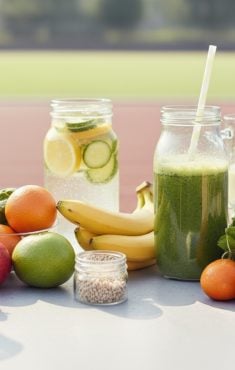Table of Contents
The problem is that commercial energy drinks can contain high doses of sugar, caffeine and other ingredients that affect long-term health and performance. In fact, several studies warn about the risks of frequent consumption, from heart rhythm disturbances to sleep and concentration problems.
So how do you maintain energy without compromising your health? The key lies in proper hydration and natural energy drinks for athletes. There are homemade alternatives that provide essential nutrients and a balanced release of energy, helping to improve endurance and muscle recovery.In this article, we’ll explore seven natural energy drinks you can make at home, ideal for before, during and after training.
why avoid commercial energy drinks?
Commercial energy drinks may seem like a quick fix to combat fatigue, but they can actually cause more harm than good, especially in young athletes.
When athletes’ lifestyles don’t match their energy needs, it’s easy to turn to these products as a shortcut to more energy.
It’s no wonder that nearly 70% of young athletes consume commercial energy drinks.
However, many are unaware that their frequent consumption can have worrying consequences.
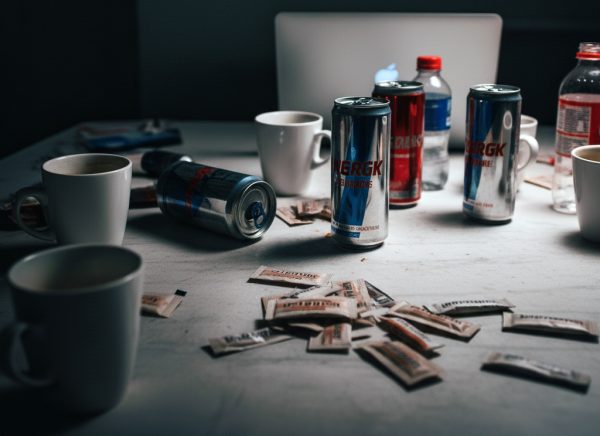
Here are the main reasons to avoid their consumption:
Problematic ingredients
Commercial energy drinks contain a combination of compounds that can have adverse effects on the body. Although they promise to increase energy and concentration, their long-term impact can be detrimental to health.
These drinks often include:
- High levels of sugar: They provide quick energy, but can cause spikes and crashes in glucose levels, affecting performance and increasing the risk of obesity.
- Caffeine in excess: It can generate anxiety, insomnia and heart problems. In young people, frequent consumption can alter the nervous system.
- Unknown stimulants: Some contain extracts of ginseng, guarana or taurine, whose effects are not regulated and may interfere with the body’s natural metabolism.
Risk of suspension from competitions
Some ingredients in energy drinks can test positive in anti-doping tests. According to the National Federation of State High School Associations (NFHS), these products are not regulated like sports drinks, which increases the risk of contamination with banned substances.
The NFHS warns that many energy drinks contain undeclared ingredients. This not only affects health, but can also cause suspensions in official competitions. To avoid risks, young athletes should opt for natural and safe options.
Negative health effects
Regular consumption of these beverages not only affects sports performance, but can also trigger short- and long-term health problems.
Some negative effects of these drinks include:
- Insomnia and chronic fatigue: Caffeine and other stimulants alter sleep cycles, affecting muscle recovery and concentration.
- Palpitations and high blood pressure: Frequent consumption can generate tachycardia and increase blood pressure, affecting the cardiovascular system.
- Irritability and anxiety: The combination of caffeine and sugar can generate changes in mood and affect emotional stability.
- Risk of dehydration: These beverages can cause rapid loss of fluids and electrolytes, reducing endurance and increasing the risk of muscle cramps.

The health impact of commercial energy drinks is so significant that the American Association of Pediatrics (AAP) advises against their consumption by minors. According to their studies, the negative effects can be even more pronounced in adolescents, as their bodies are more sensitive to stimulants and imbalances in sugar levels.
the best option? Opting for natural homemade energy drinks, made with fresh ingredients that provide energy without compromising health. Here are some of the best options.
Nutrition and Energy: The Key to Sports Performance
A young athlete’s body needs more than just consistent workouts to perform at its best. Energy comes from a balanced combination of nutrition, rest and, of course, adequate hydration.
Without these elements, it is difficult to maintain a good performance without fatigue or risk of injury.
The importance of a balanced diet
The type of food consumed throughout the day directly influences energy levels and muscle recovery. Poor nutrition can lead to a constant feeling of fatigue, decreased endurance and increased risk of injury.
To maintain stable energy, it is advisable to:
- Include quality carbohydrates, such as oatmeal, brown rice or sweet potatoes, which provide sustained energy without sugar spikes.
- Ensure adequate protein intake from lean meats, eggs, dairy or legumes, which are essential for muscle recovery.
- Incorporate healthy fats, such as avocado, nuts and olive oil, which contribute to energy production and brain function.
A balanced diet not only improves performance, but also helps prevent fatigue and accelerate recovery after exercise.
Rest and recovery: the other pillar of energy
Rest is as important as training. Getting good sleep and allowing the body to recover is key to maintaining endurance and avoiding injury.
Athletes who combine good nutrition with adequate rest have better energy levels, greater concentration and lower risk of muscle fatigue.
It is recommended:
- Sleep between 8 and 10 hours a day to optimize muscle recovery.
- Incorporate rest periods between workouts to avoid overexertion.
- Reduce the use of screens before sleeping to improve sleep quality.
In addition to good nutrition and rest, natural energy drinks for athletes can be a great ally when chosen correctly.
7 Recipes for Healthy Energy Drinks
Not all energy drinks are harmful. In fact, there are natural options that can provide an energy boost without compromising health. These drinks combine ingredients that promote physical performance, muscle recovery and proper hydration.
Here are seven natural homemade energy drinks, each designed to provide energy at different times of the day.
1. Peanut Butter Banana Shake: Sustained Energy for Morning Workouts
Training in the morning can be a challenge if the body hasn’t received the right amount of nutrients. In those cases, this smoothie is an excellent choice to provide energy without feeling heavy.
Plus, its combination of protein, healthy fats and carbohydrates helps keep energy stable for longer, avoiding sugar crashes.
Ingredients:
- Banana: source of fast-absorbing carbohydrates and potassium to prevent cramps.
- Peanut butter: provides protein and healthy fats for sustained energy.
- Oatmeal: rich in fiber and complex carbohydrates, maintains satiety and stable energy.
How to prepare: Blend 1 frozen banana, 2 tablespoons peanut butter, 1 cup milk (or vegetable drink), 2 tablespoons oatmeal and 1 tablespoon honey in blender.
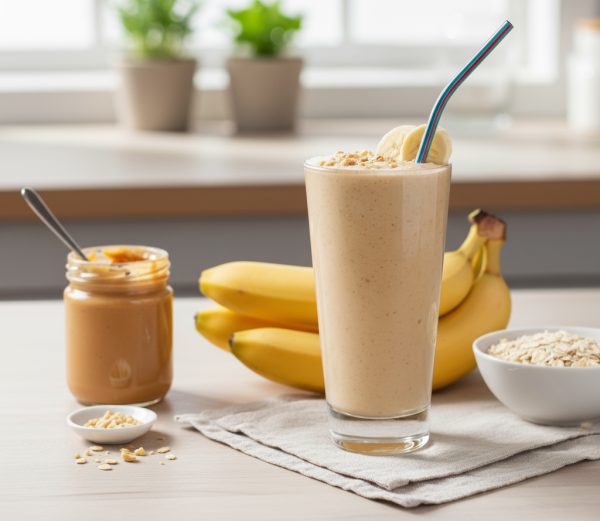
2. Electrolyte drink with glucose: Hydration and energy for training
During sports practice, the body loses essential minerals through sweat. Recovering them is key to maintaining performance and avoiding fatigue.
This homemade drink is a natural alternative to commercial ones, providing electrolytes without the added sugars and artificial additives.
Ingredients:
- Coconut water: a natural alternative to commercial sports drinks, rich in electrolytes.
- Honey: source of glucose for a quick energy boost.
- Citrus juice: provides vitamin C and enhances mineral absorption.
How to prepare: mix 1 cup coconut water, ¼ cup lemon juice, ¼ cup orange juice, 2 teaspoons honey and a pinch of sea salt.
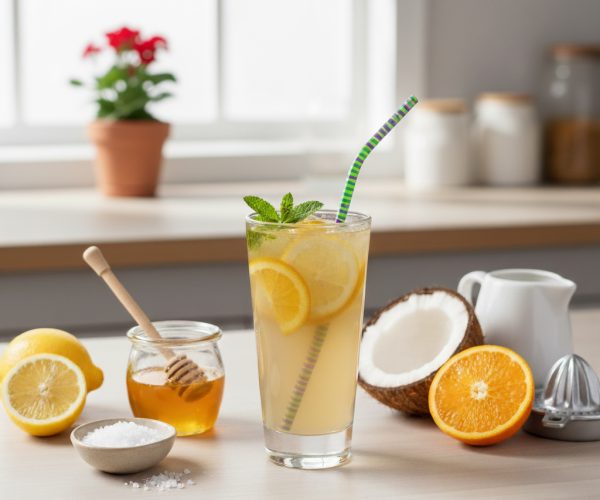
3. Watermelon and black tea energy juice: An extra boost of energy with antioxidants
This refreshing juice is a perfect pre-workout option. Watermelon provides hydration and natural carbohydrates, while black tea provides a slight caffeine boost without the effects of commercial drinks.
Plus, this combination helps improve circulation and keep muscles well oxygenated during exercise.
Ingredients:
- Black tea: a powerful natural energizer with antioxidants.
- Watermelon: hydrates and provides fast-absorbing natural sugars.
- Coconut water: replenishes essential electrolytes.
How to prepare: Blend 1 cup of diced watermelon, 1 cup of cold black tea, 1 cup of coconut water and the juice of 1 lemon.
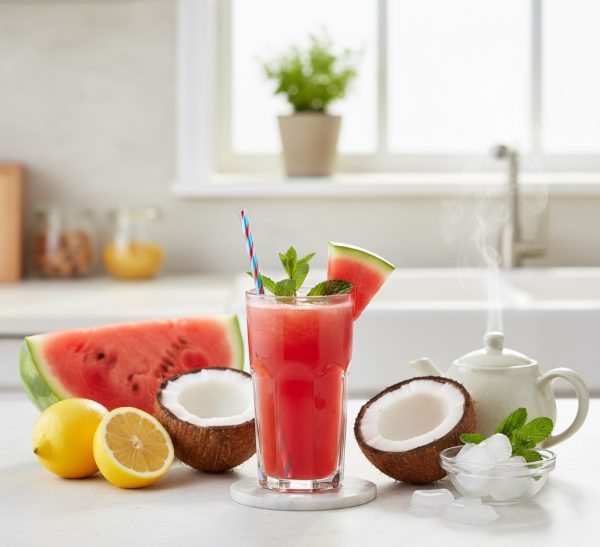
4. Citrus-based green tea energy drink: Vitality and focus
If you’re looking for an alternative to commercial drinks, this option combines the power of citrus with green tea, which improves concentration without generating a sudden surge of energy.
Thanks to its antioxidant content, it also protects the immune system and helps fight oxidative stress caused by exercise.
Ingredients:
- Green tea: contains natural caffeine and antioxidants.
- Lemon and orange juice: provides essential vitamins and minerals.
- Honey and sea salt: promote muscle recovery.
How to prepare: Mix 1 cup of green tea, 1 cup of lemon juice, ¾ glass of orange juice, 2 tablespoons of honey and a pinch of salt.
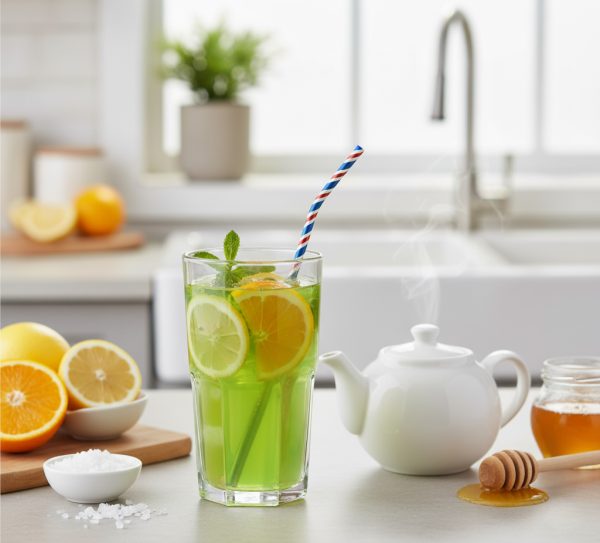
5. Golden milk with turmeric: Energy and anti-inflammatory recovery
This drink not only provides energy, but also helps reduce inflammation and promote muscle recovery. It is perfect for after training, as its combination of turmeric and ginger helps reduce muscle soreness and improve post-exercise recovery.
Ingredients:
- Milk or vegetable drink: source of essential proteins.
- Turmeric and ginger: natural anti-inflammatory properties.
- Honey and cinnamon: provide a sweet touch and enhance digestion.
How to prepare: Heat 1 cup of milk with ½ teaspoon of turmeric, ½ teaspoon of powdered ginger, 1 tablespoon of honey and a pinch of cinnamon.
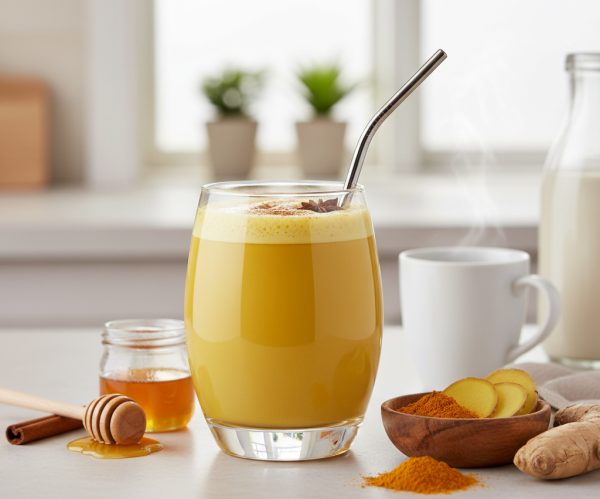
6. Oatmeal and cocoa smoothie: Lasting energy for the day
Pure cocoa is a natural source of energy and antioxidants, while oats provide complex carbohydrates that release energy slowly.
This drink is ideal for before an intense day, as it prevents glucose spikes and maintains focus and endurance for longer.
Ingredients:
- Oats: maintains stable blood sugar levels.
- Pure cocoa: improves mood and provides magnesium for muscle function.
- Milk or vegetable drink: source of protein and calcium.
How to prepare: Blend 1 cup of milk, 3 tablespoons of oatmeal, 1 tablespoon of pure cocoa and 1 teaspoon of honey.
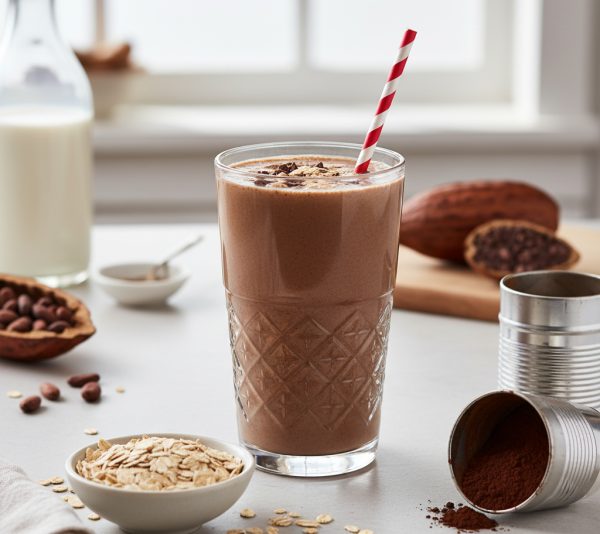
7. Beet and carrot juice – A natural endurance boost
Beet juice is known for its ability to improve endurance in high-performance sports, thanks to its natural nitrate content.
Its combination with carrot and ginger boosts muscle oxygenation, allowing you to maintain a higher training pace without premature fatigue.
Ingredients:
- Beet: increases muscle oxygenation and improves endurance.
- Carrot: rich in beta-carotene and antioxidants.
- Ginger: promotes circulation and reduces muscle fatigue.
How to prepare: Blend 1 medium beet, 2 carrots, 1 piece of ginger and 1 cup of water.
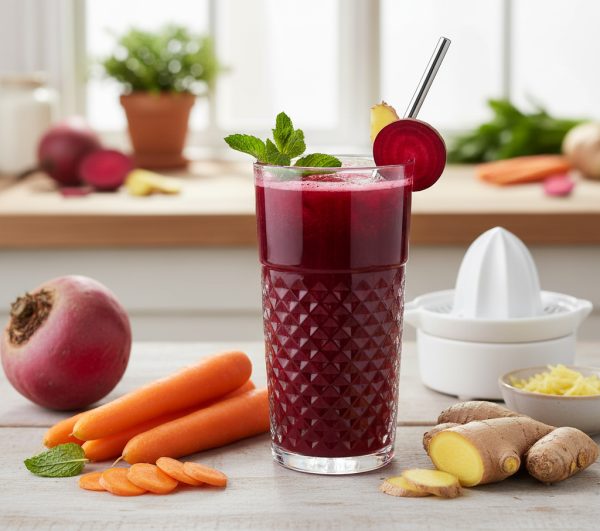
Importance of hydration in sports performance
In addition to choosing healthy energy drinks, hydration plays an essential role in the performance of young athletes.
It is not enough to consume fluids only when you feel thirsty; maintaining constant hydration is key to avoid fatigue, improve muscle recovery and optimize performance in each workout.
According to a study published by the Gatorade Sports Science Institute (GSSI), even mild dehydration of 2% of body weight can significantly affect endurance and concentration.
That’s why it’s critical for young athletes to have good hydration habits before, during and after exercise.
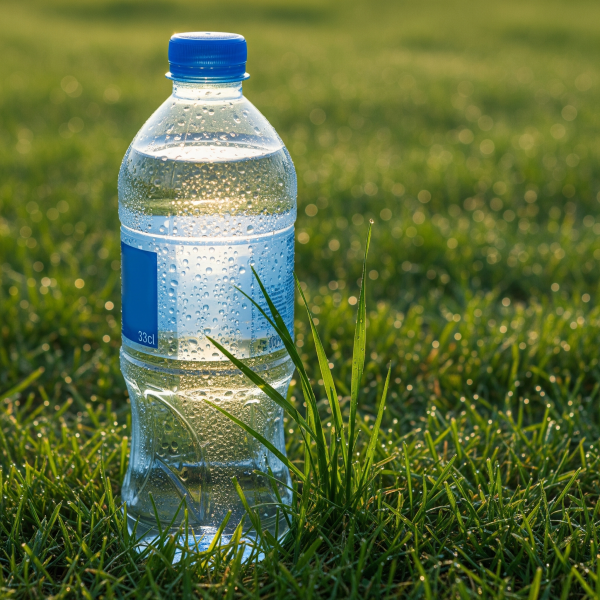
how does dehydration affect performance?
When the body does not receive enough fluid, physical and mental performance is compromised. The most common symptoms of dehydration in athletes include:
- Loss of energy and early fatigue: The body works harder to regulate temperature, which reduces exercise efficiency.
- Muscle cramps: Lack of essential electrolytes, such as sodium and potassium, can cause painful spasms.
- Reduced concentration: Dehydration affects coordination and reaction time, which can increase the risk of injury.
- Decreased cardiovascular performance: The heart must pump faster to compensate for the lack of fluids, increasing physical exertion.
how much water do young athletes need?
Hydration needs vary according to age, activity level and ambient temperature. However, some general recommendations include:
- Before exercise: drink between 400-600 ml of water at least 30-60 minutes before training.
- During exercise: Consume between 150-250 ml every 15-20 minutes, depending on exercise intensity.
- After exercise: Replenish lost fluids with at least 500-700 ml of water, depending on the duration and perspiration of the workout.
In prolonged workouts or in hot climates, it is advisable to supplement hydration with natural energy drinks for athletes, such as those mentioned above, to replenish electrolytes in a balanced way.
Conclusion: Energy and performance with healthy habits
Choosing healthy energy drinks is only part of the puzzle for young athletes to reach peak performance. Beyond an occasional drink to replenish energy, a balanced diet, good rest and proper hydration are essential to staying fit and avoiding fatigue.
At Ertheo, we understand the importance of a holistic approach to the development of young athletes. Our high-performance sports camps not only provide quality training, but also educate young people on healthy habits to enhance their performance.If you want to learn more about our programs and find the best one for your child, contact us.
A complete sports education starts with the right decisions on and off the field.

